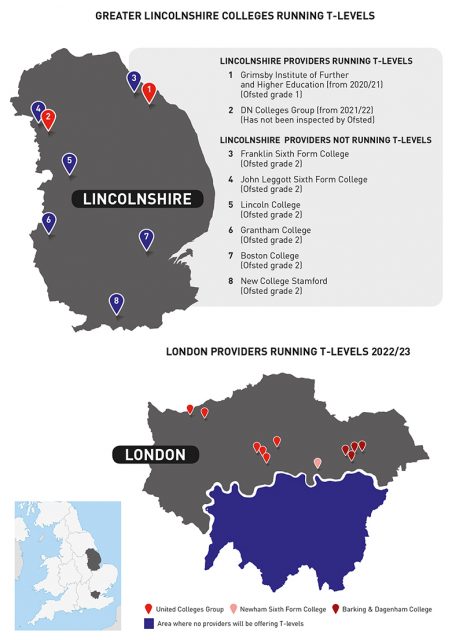An FE Week investigation into T-level cold-spots has found six out of eight college principals in Lincolnshire appear to have turned their backs on the opportunity, with one telling FE Week the mandatory industry placement requirement in the region was “really, really difficult”.
We also found no colleges or training providers in London would be offering the construction T-level from September this year, something the Mayor of London said he is “concerned” about.
Lincolnshire colleges refusing to join the party
The lack of T-level industry placements in Lincolnshire appears to have been acknowledged by the Department for Education, with a series of meetings lined up so they can speak to the college principals, FE Week understands.
But officials declined to comment on the problem beyond repeating a previous statement concerning a “phased approach to the introduction of T-levels so they can grow in a managed way”.
It remains unclear how the lack of industry placements opportunities in the Lincolnshire area will be resolved.
Of the eight grade one and two colleges in the Greater Lincolnshire area, only Grimsby Institute of Further and Higher Education will be running the digital and education routes in wave one this year, and DN Colleges Group, which includes North Lindsey College and will be running all four routes in wave two from next year.

This means learners will have to put in the miles if they want to take T-levels: students at New College Stamford, for example, would have to travel out of the county to Derby College, a journey estimated to take an hour and a half by car.
None of the remaining six colleges are part of wave one or two, nor would any of them commit to applying to run the next wave of T-levels from 2022 when asked by FE Week, after the Department for Education (DfE) invited expressions of interest this month.
Boston College principal Jo Maher said they are “carefully considering and reviewing” the expression of interest requirements for wave three, and will be looking at the work placement requirements and local demand to ensure any expression “set learners up to succeed with local demand”.
She explained that her college had not gone for T-levels due to problems around the industry placement, which the college found “a challenge for rural areas”.
Also, at the time of applying for the early pathways, she said “we did not feel that there was enough course detail to market to prospective students and to develop the content”.
Franklin College is “reviewing the situation as more information comes from the pilot centres and are considering our options for the next wave at this time,” a spokesperson said.
One college which will not be going for wave three is New College Stamford after it was rejected for wave two; though its decision is also because of the demands of an ongoing merger with Peterborough Regional College.
Principal Janet Meenaghan said her college had also faced challenges around industry placements, the 315-hour work experience requirement for T-levels which partly caused education secretary Gavin Williamson’s alma mater Scarborough Sixth Form to drop out of the T-level programme in October.
Williamson said at the time that his old college took the “right decision” by pulling out and promised to convene business leaders to thrash out a solution.
 New College Stamford has been part of the capacity and delivery fund piloting industry placements: they met their target of putting 74 learners on placements last ear; but Meenaghan believes that while well over 100 will be placed this year, they will struggle to meet their target of around 142.
New College Stamford has been part of the capacity and delivery fund piloting industry placements: they met their target of putting 74 learners on placements last ear; but Meenaghan believes that while well over 100 will be placed this year, they will struggle to meet their target of around 142.
“The challenges of making it work are really, really difficult in this location,” she said, because 98 per cent of Lincolnshire’s businesses are small or micro businesses, and a lot are just one or two people.
“You have to supervise and give a student something meaningful when they are there. How do you do that when you’re a tiny business? You haven’t got the capacity.”
And her learners have to travel to placements using “poor” public transport and road infrastructure, when some take more than an hour and half to reach the college as is.
The college has told the Department for Education they do not think they will be able to hit the placement target this year.
Meenaghan said she thinks the placements are a good idea and T-levels, as a whole, are “fantastic”: “I wish I had this as a young student. I would have loved it.”
After the DfE announced it would be exploring flexibilities for industry placements last year, Meenaghan put forward letting learners count paid work as part of their placement because students may have to give up work to get in the hours of the industry placement and “they’re reluctant to do that.”
London missing construction course opportunities
The Mayor of London, Sadiq Khan, has said he his “concerned” that the T-level in construction will not be offered by any providers in capital in the next academic year, or any in south London from 2021.
He believes the government “must to do more to address this gap in provision”.
Of London providers starting this year, just one is a college (Harrow and Uxbridge) and none of them are running the construction T-level, so London learners will have to travel out to providers like East Sussex College Group, Chichester College Group or Havant and South Down College.

The three London-based providers of the construction route from 2021 – Barking and Dagenham College, Newham Sixth Form College, and United Colleges Group – are all based north of the river.
There was one provider delivering the construction T-level south of the river that year, Richmond-upon- Thames College.
However, they withdrew from delivery last week, so they could focus on developing their campus.
But a spokesperson left the door open to running the qualifications in the future, saying it could introduce them “at a later stage, rather than in 2021”.
They were also scheduled to deliver the digital, education and childcare, and health and science routes.
Construction skills have taken on added importance under Khan as he has led the Greater London Authority to set up a construction academy and bestow a quality mark upon providers recognised as delivering high-quality construction skills training in the capital.
So far, 24 providers have received the quality mark, including Barking and Dagenham College and United College Group, and applications for it are due to reopen this year.









I feel that the T Levels are a disaster just around the bend, Trainee-ships need placements, 16 to 18 apprentices are down in most vocational areas as employers find the 205 off the job training and flexibility is not there. Also lots of young people do not have a fit with colleges. Also I found recently in London a young girl said she had never been on a bus, and could only work from 10 to 4 as her Mum did not want her out on the streets with knife crime on the rise. Never mind being in a rural area with very little connection with transport links.
I am all for addressing skills shortages and revamping qualifications to allow for higher quality products to be delivered however within construction the Industry Placement is extremely difficult to meet. The fluid nature of construction (many sites/work spread over large distances) makes any kind of lengthy placement almost impossible. I would really like to know if that is why the London providers have stepped away from construction related T Levels?